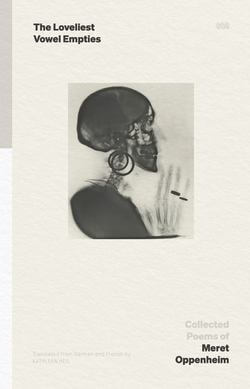
The Loveliest Vowel Empties
Format
PaperbackRelease date
February 2023Publisher
World Poetry BooksWeight
7.7 ozSize
5.5 x 0.5 x 8.75 inThe Loveliest Vowel Empties presents for the first time in English the collected poems of legendary Swiss Surrealist Meret Oppenheim, printed with facing-page originals in German and French.
Oppenheim's poetry--49 poems written between 1933 and 1980--moves beyond Surrealism to inhabit a voice all her own, with imagery and sound that, as the Herald Tribune wrote, "express witty and poetic responses to the surprises of life." A key figure of the Paris art scene in the 1930s, Oppenheim moved in a circle that included André Breton, Man Ray, Marcel Duchamp, Max Ernst, and Elsa Schiaparelli. Writing for the Village Voice about her work, Gary Indiana noted that "the singularity of Meret Oppenheim's work is such that nothing seems dated … the range of the work and its quirky self-assurance are striking." The publication of her collected poems coincides with a major retrospective exhibition of her artwork at the Museum of Modern Art in New York.
"I am in awe of Meret Oppenheim's poems, a seismic force heretofore unknown to me. Her aesthetic compatriots include Alejandra Pizarnik, Georg Trakl, Max Jacob, and Paul Celan--artists of deep symbol, deep void. Kathleen Heil's translations are themselves works of the highest literary refinement and ingenuity. To read Oppenheim's lyric bulletins, conveyed tactfully into English, is to feel that we are plunging for the first time into the pure waters of poetry itself, impervious to fad. No dross, no affectation: instead, Oppenheim gives us strangeness, tone, translucency."--Wayne Koestenbaum
"What an ingenious way of translating this superbly ingenious poet/artist! Over and over, Kathleen Heil selects a word which many would find out of the way, although I find this a true delight. To me, it feels as deeply surrealist as possible. Two examples may suffice: for the verb 'nimmt,' she offers us the rare 'thieves' instead of the far more usual 'steals' or 'robs'; while for 'Wie rät ein Untergang dem nächsten?' she selects the far less ordinary phrase: 'How does one demise advise the next?' thus capturing a near-echo. Such a gift proves true throughout this all-in-all inventive rendering. The extraordinary Meret Oppenheim deserves no less!"--Mary Ann Caws
"The singularity of Meret Oppenheim's work is such that nothing seems dated … the range of the work and its quirky self-assurance are striking."--Gary Indiana, Village Voice
"What makes Meret Oppenheim both fresh and modern is her ability to produce works that express witty and poetic responses to the surprises of life."-- Herald Tribune



